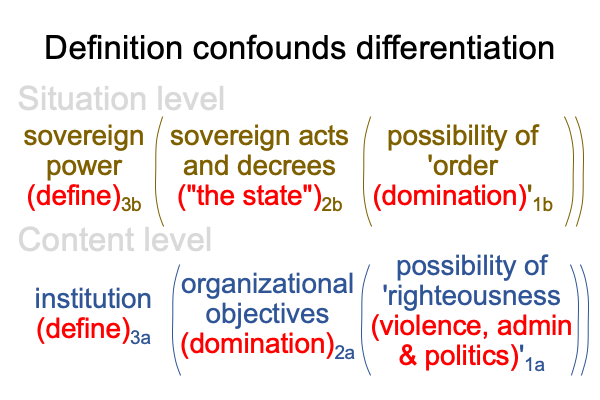0242 Why does the state2b have no origin?
On one hand, the word, “state”2b occurs in a situation-level definition3b, supplemented by a content-level definition3a that informs the situation-level potential1b. Consequently, academics debate what the potential1b underlying the state2b must be. What is content-level actuality2a? It depends on the anthropologist.
On the other hand, sovereign power3b virtually emerges from (and situates) institutions3a. Sovereign power3b does not “originate”, sovereign power3b differentiates from institutions3a.
Modern academics confound the term, “state”2b, with the situation-level actuality of sovereign acts and decrees2b. This explains why social scientists are certain that there is a (content-level) causality involved in state formation and that they can figure out its definition. In contrast, Graeber and Wengrow insist that historical contingency and what people think are relevant and cannot be theoretically defined.
0243 Oh, the confounding is so easy to do. Here is a modified picture of the first two levels of the societyC tier.

0244 Shall I conclude that the “state”2b should directly emerge from (and situate) the potential of ‘order’1bC in the normal context of sovereign power3bC?
Shall I surmise that the situation-level potential for ‘order’1bC virtually emerges from (and situates) the content-level potentials of ‘controlling violence, administrating information and selecting who is charismatic and who is not’1a?
0245 Graeber and Wengrow offer a pragmatic identification of the term, “state”2b, as a correlate to a definition of the term, “domination”2a. In the normal context of anthropology3a, the spoken word, “domination”2a, directly emerges from (and situates) the potentials of exerting violence1a, directing information1a and manifesting charismatic influence1a. Thus, the “state”2b, coincides with sovereign acts and decrees2bC, when the potential for ‘order’1bC meshes with potentials that define ‘domination’1b.
0246 In short, in Graeber and Wengrow’s theory, the state2b is an apparatus for domination2a, by definition.
The problem?
Oh, I already noted the problem. The situation-level potential for ‘order’1bC virtually emerges from (and situates) the content-level potential of ‘righteousness’1aC.
The state2b has no origin because domination1b is not founded in righteousness1aC.
Unless, of course, the inquirer believes the propaganda of the day.
Recognize the possibility.
